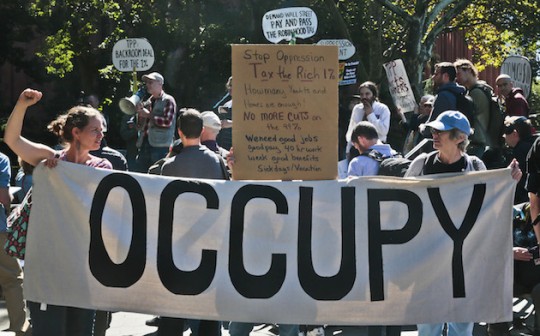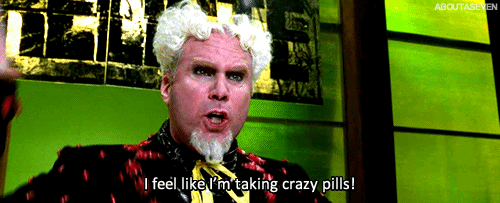Results 1 to 1 of 1
Thread Information
Users Browsing this Thread
There are currently 1 users browsing this thread. (0 members and 1 guests)
-
09-08-2014, 10:47 AM #1Banned

- Join Date
- Jun 2013
- Posts
- 8,546
Berkeley Chancellor: Freedom of Speech Means Restricting Political Speech BY: Sonny
Berkeley Chancellor: Freedom of Speech Means Restricting Political Speech
Washington Free Beacon
Berkeley Chancellor: Freedom of Speech Means Restricting Political Speech
BY: Sonny Bunch
September 8, 2014 9:53 am
 Political advocacy that likely isn't covered under the First Amendment. Wait, what? (AP)
Political advocacy that likely isn't covered under the First Amendment. Wait, what? (AP)
Ken White had a bit of fun over the weekend fisking a monumentally awful letter authored by U.C. Berkeley Chancellor Nicholas Dirks. Please read the whole thing; it’ll get your week started off on the right foot.
I just wanted to focus on one very brief snippet of Dirks’ insanely awful thought process:Yet this is easier said than done, for the boundaries between protected and unprotected speech, between free speech and political advocacy, between the campus and the classroom, between debate and demagoguery, between freedom and responsibility, have never been fully settled.Emphasis mine. As White wrote about the bolded portion, “This proposed distinction is a sign of civic illiteracy. Political advocacy is not distinct from free speech. Political advocacy is the apotheosis of free speech.” And that is true! To argue that there is some sort of logical distinction in the United States between “free speech” and “political advocacy” is the most rancid form of pernicious nonsense. It is totally ahistorical and utterly unjustified by decades of Supreme Court jurisprudence.
And yet, this rancid, pernicious claptrap undergirds much of the thinking about freedom of speech on the left. It’s why the left was so angered by the Citizens United case—a case that, it is always worth reminding people, centered around lawmakers and judges trying to tell a group of citizens that they were not allowed to distribute a documentary about a politician in the months ahead of a election.
The First Amendment is pretty straightforward on this topic: “Congress shall make no law … abridging the freedom of speech, or of the press.” The First Amendment doesn’t say “shall make no law … abridging the freedom of speech, except for those groups that The Wise Council of Elders have determined to be engaging in ‘political advocacy.’” I sincerely doubt it would’ve even occurred to the founders to think that. Political advocacy is the entire reason to protect free speech. The First Amendment is explicitly designed so that the government cannot ban people it doesn’t like from saying things it doesn’t want the people to hear. Doesn’t anyone notice how insane this argument is?

The tenuous nature of this exceptionally basic political freedom is distressing. I cannot help but shake my head reading the following paragraph, from a Reason blog post asking “Will Elena Kagan Allow Books to be Banned?”Kagan conceded that although the statute in question did cover “full length books” it would be subject to “quite good” challenges if it was ever so applied in practice. Moreover, she pointed out that the Federal Election Commission never enforced the law with respect to books, implying that citizens should not worry about being prosecuted. Chief Justice Roberts immediately seized on this, saying “We don’t put our First Amendment rights in the hands of FEC bureaucrats.” He then asked whether the statute could be used to ban a pamphlet. Such a publication, Kagan admitted, would be different; “a pamphlet is pretty classic electioneering” and could be constitutionally prohibited. She tried to reassure the justices that a book containing hundreds of pages could not be banned just because the last sentence endorsed a candidate, as her deputy had claimed a few months earlier. However, she strongly implied that if the book engaged in “express advocacy” as a whole, it could be banned. Her position would seem to require the FEC to define the differences between books and pamphlets and decide how many sentences in a book are necessary to qualify as “express advocacy.” Kagan never addressed whether it was desirable for FEC staffers to become either book reviewers or a de facto national censorship committee. Ultimately, the Court ruled against Kagan by a 5-4 margin.The fact that there are four liberal justices on the Supreme Court who think the United States government should be in the business of determining what types of political speech are acceptable—where the boundary between between free speech and political advocacy resides, to use Dirks’ phrasing—is remarkably distressing. And it’s a frightening reminder that Dirks’ argument isn’t some fringe belief cloistered away in the academy. This is what the left believes. It is what they will push for if they pick up any more seats on the Supreme Court.
http://freebeacon.com/blog/berkeley-...itical-speech/Last edited by kathyet2; 09-08-2014 at 11:17 AM.
Similar Threads
-
UC Berkeley Chancellor Ties AZ1070 to Giffords Shooting
By jamesw62 in forum General DiscussionReplies: 26Last Post: 01-14-2011, 11:11 PM -
Basic American Principles: Freedom of Speech, Freedom of Rel
By AirborneSapper7 in forum Other Topics News and IssuesReplies: 0Last Post: 12-31-2009, 10:01 PM -
Acorn and Police Restricting Right of Speech
By Newmexican in forum Videos about Illegal Immigration, refugee programs, globalism, & socialismReplies: 0Last Post: 07-31-2009, 10:40 PM -
THE END OF FREEDOM OF SPEECH
By StokeyBob in forum General DiscussionReplies: 55Last Post: 10-09-2006, 08:16 PM -
Freedom of Speech
By curiouspat in forum General DiscussionReplies: 4Last Post: 05-11-2006, 11:51 AM


 LinkBack URL
LinkBack URL About LinkBacks
About LinkBacks




 Reply With Quote
Reply With Quote


Illegal Alien Arrested in Crash That Killed Staffer of Democrat...
04-18-2024, 09:31 PM in Americans Killed By illegal immigrants / illegals